I am about halfway with my earth oven being built from Kiko Denzer's book. I also have the Alan Scott book, but decided on an earth oven as the reuse of material appeals to me. Many friends are highly sceptical about building with clay.
It took quite a while to scrounge for the material as I wanted to buy as little as possible. The rocks for the foundation I found in the garden and then I filled it with building rubble from a nearby restaurant that burnt down (hope that does not predict disaster with the oven). The gravel I found on an open lot where someone dumped it. The wine bottles are all from our own consumption over quite a while :).
The hearth should be on a nice level once finished as the oven is being built on a terrace.
The sawdust I had to buy in the end and it cost about $4. The bag it came in was almost as expensive.
I realised that the front part needed some work and then happened upon some nice flat rocks. The next photo shows an improvement where the tongue will be.
I am now ready to bring the level up with a sawdust and clay mix around the slab. That will be followed with a thin layer of sand bedding for the fire bricks.
I finished the first layer all by myself and that was not a good idea. Some friends would have made it easier, but I was in a hurry and nobody was available on that sunny day. After two weeks of sitting underneath the sheet in pouring rain, I started a small fire. As you can see the clay was still quite moist. I wanted to see if the fire would burn before finishing with an insulation layer and the rest.
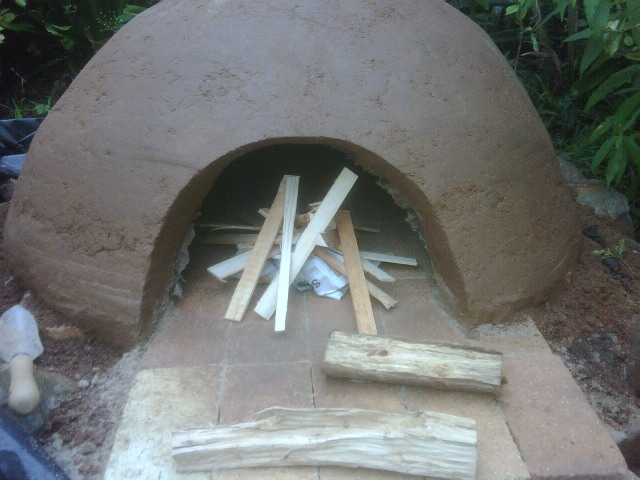
The fire burnt very nicely and started to dry out the clay.
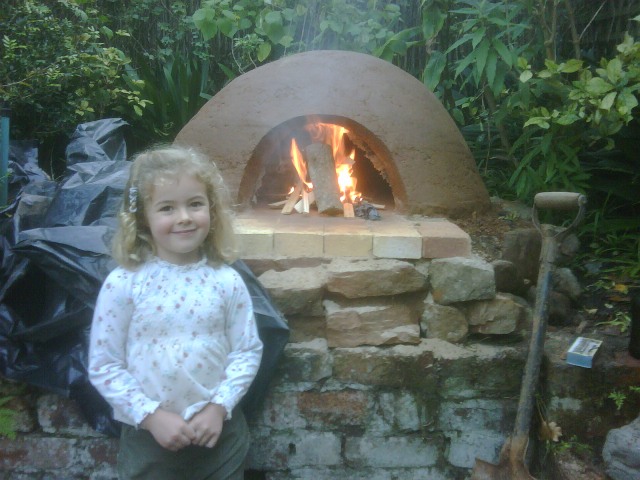
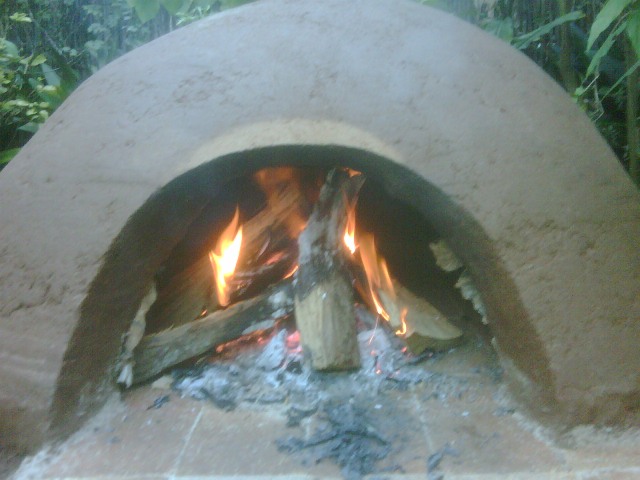
I let it burn for quite a while. The next day the oven looked dry, except for the bottom part where it was still moist. So I started another fire and made it nice and big. Oh, the horror: it cracked! I suppose that is what you get for being impatient.
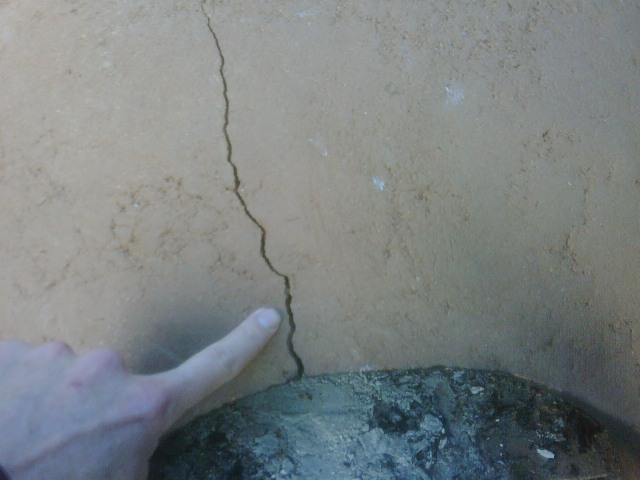
The crack then spread over the dome. I am hoping that it is not too serious, since it does not seem to have cracked right through. That means I cannot see through the cracks.
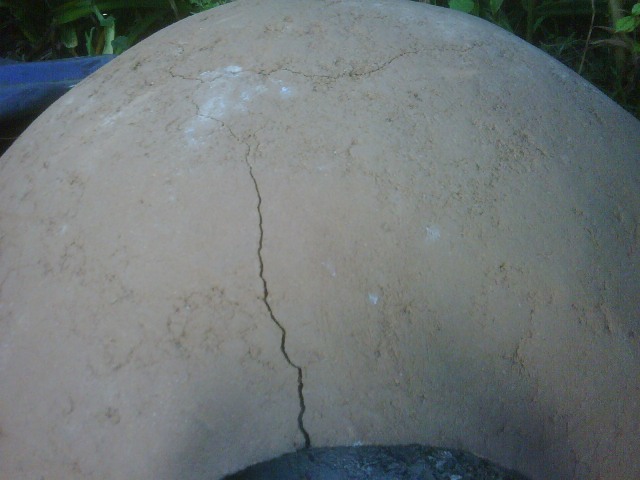
I am planning to patch it up with some sloppy clay, but I would appreciate any tips here.
BTW, we cooked a chicken in the oven four hours after the fire died down. It went in for 2 1/2 hours and was beautifully soft. Because it was so late in the process, I had to brown the chicken in the electric oven.
Now it is August and the process took much longer than anticipated. At least I think it is finished and I cannot wait for it to dry out.
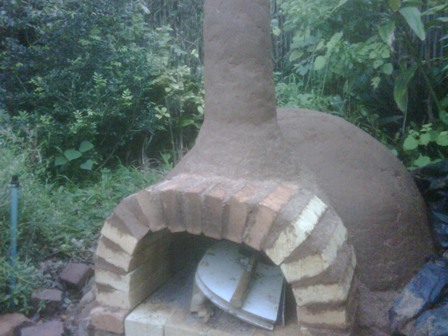
So I added a chimney and a brick arch. If I had to do it again, I am sure the arch would be better.
Some time later a friend helped me to add the insulation layer of clay slip and wood shavings. Here it is almost finished.
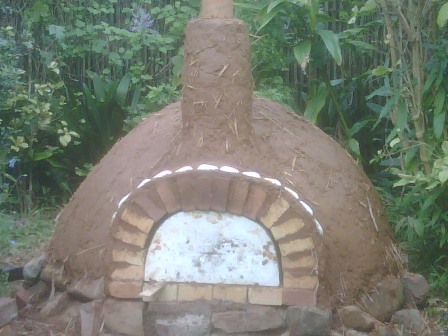
The past weekend I finished the oven. Guess who did not read the book again and forgot to chop the straw. Now I have a hairy oven. Unfortunately we are away this weekend, so I cannot try it out. Hopefully there is no rain the weekend after that, so I can fire it up proper and see what happens. Will post some pictures if it works out.
- boule's Blog
- Log in or register to post comments
I've already made a start on my clay oven; I'm busy emptying wine bottles as fast as I can :-D
Your project is looking good. Keep posting pics of your progress!
Please continue to post updates and pictures.
I recently bought Denzers book as well and plan to build an earth oven in my backyard in the April/May.
Darren
YES Please keep us posted with your photos. I have been pondering the idea of building one myself but have not had the courage to try. Your photos will be very helpful!
Very cool! Looks neat, what are the wine bottles for?
Here is something I came across regarding the cracks.
"
Drying the oven
Once finished with the oven it must be given sufficient dry time. Starting small fires inside the oven to provide warmth and to facilitate evaporation of moisture can quicken drying the oven. It is a good idea to use several of these small fires over a couple of days in the oven to help dry it out, especially if you live in a moist climate. We built three small fires in our oven to help get the moisture out before firing it to cook with. Our oven did experience some cracking in the dense layer however. The fix for cracks is to patch it up with material that is the same mix as whichever layer cracked. So, for our oven we used a 2:1 sand/clay ratio mix to patch it up, and it has lasted well through at least two hot firings. After these small drying fires it is time to begin cooking. With the oven itself completed, a door will need to be constructed to help keep the heat in while baking. The door is basically just a wooden plug that is fit to slide into the doorway of the oven. It can be covered with foil to keep it from burning, but some people find that when cooking it helps to drape a wet cloth over the door to let more moisture into the baking chamber."
http://www.appropedia.org/Blue_ox_earthen_oven
I will patch it up before putting the next layers on.
The bottles serve the same purpose as the pumice layer, it is insulation. I liked the idea of recycling.
Will keep you posted on the progress.
Willem
Where did you get your clay? Where we live is all sand. We are in the middle of a similar project and it's going very slowly. I'm anxious to hear more about yours.
I also just have sand at my house, but we are lucky enough to have quite variable geology and when neighbours at the office were doing some building work, I just loaded quite nice clay from their yard. I did look into buying something like kaolinite, which would have been not too expensive as you do not need a lot. You can get in powder form for easy mixing.
First choice is to scrounge a bit. I am fortunate to have geology background, but maybe you can get some advice from a local geologist.
Good luck
Willem
Thank you! I will look into that. Mary